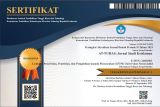Peranan Tentara Nasional Indonesia dalam Penindakan Terorisme Berbasis Agama
Authors (s)
(1) * Atikah Mardhiya Rohmy
 (Universitas Merdeka, Malang)
(Universitas Merdeka, Malang) Indonesia
(2) Teguh Suratman (Universitas Merdeka, Malang)
Indonesia
(3) Arini Indah Nihayaty (Universitas Airlangga, Surabaya)
Indonesia
(*) Corresponding Author
AbstractThe purpose of this research is to find out and to analyze problem and the role of the TNI Special Operations Command (Koopssus TNI), as well as obstacles faced by the TNI Special Operations Command in the prosecution of terrorism in Indonesia. This research is discussed and motivated by the increasing complexity of terrorist acts which use the latest technology, international networks and close links with other transnational crimes, as well as endangering national and international security. The research method is conducted using normative law, while the source of legal material used is through secondary legal material which is material obtained through library studies by examining various references relating to the object of this thesis study such as books, legislation, scientific journals, print and electronic media. The statutory regulations in this study are the Law of the Republic of Indonesia Number 5 of 2018 concerning Eradication of Terrorism Crimes, Law Number 34 of 2004 concerning the Indonesian National Army and Presidential Regulation Number 66 of 2019 concerning the Composition of the Organization of the Indonesian Armed Forces. Based on the results of this study it can be seen that terrorism is not only a criminal offense, but also is broader than that. Terrorism is anything that wants to change Ideology, including those based on religion. The Special Operations Command of the TNI handles Terrorism Crimes which is highly escalated and its deployment under direct order from the President. The TNI Special Operations Command is a new structure within the TNI, and addresses urgent issues. The role of the TNI Special Operations Command is not optimal because it is a relatively new organization. Its existence is as expected because it accommodates the interests of the TNI, related to being able to handle strategic matters at the national level so as to accelerate its deployment under direct command from the TNI Commander. Keywords:TNI Special Operations Command (Koopssus TNI), Role, Obstacles, Terrorism |
Keywords
Full Text: PDF
Refbacks
- There are currently no refbacks.
Copyright (c) 2020 Atikah Mardhiya Rohmy
This journal is licensed under a
Creative Commons Attribution-ShareAlike 4.0 International License
P-ISSN: 2355-567X, E-ISSN: 2460-1063





.png)






